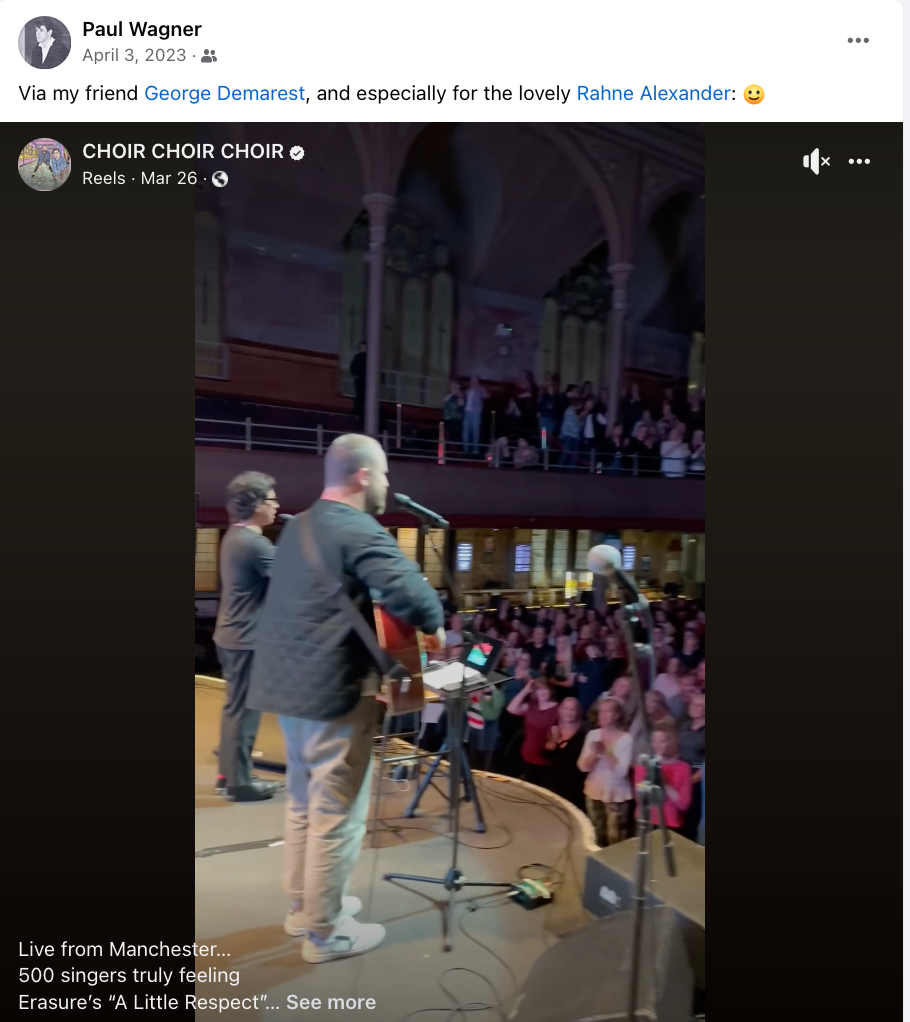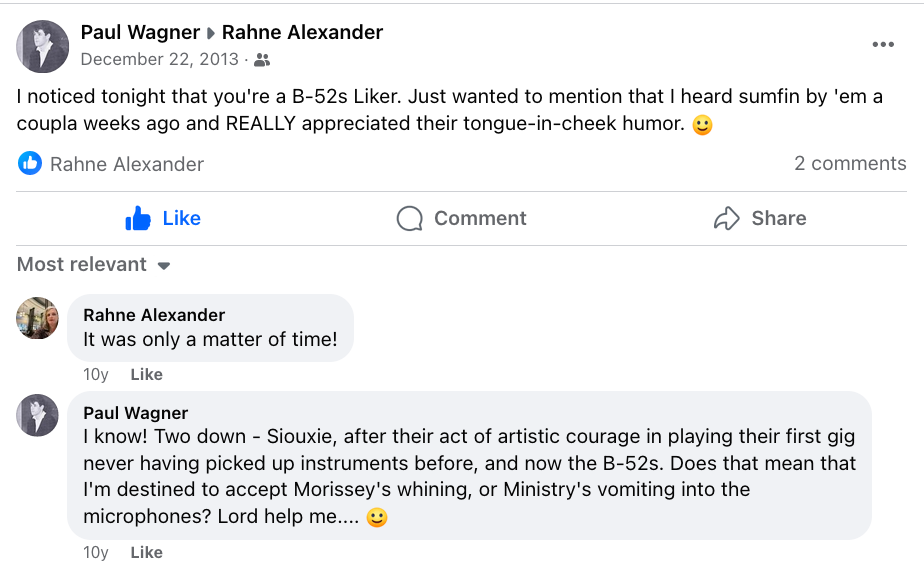In Baltimore, reports of Blake Harrison’s passing were beginning to ripple through the socials. While I was familiar with a few of Blake’s projects — my favorite being Hatebeak, the death metal band fronted by Waldo the grey parrot — I don’t know that I ever met him. While his impact on Baltimore’s music scene was significant, our precise circles never quite overlapped.
But I had other things on my mind. I was hearing from friends in Santa Cruz that my friend and mentor Paul Wagner was in ICU, that he didn’t want visitors — or maybe they weren’t allowed. There wasn’t a lot of information available. I watched the heartbroken memorials to Blake flourish in my various feeds while I worried and tried to keep my mind on work.
The days went by, he remained in ICU and by bit more information rolled in. Paul wasn’t talking, but he’d squeeze your hand in response to your question. Reason to hope. One friend told me he was going to visit, and I said, “When you see Paul, tell him I love him and that I’m going to do one of his songs at my show on Tuesday.”
For all the times Paul sang his songs to me, I had very little of his recorded music. I’ve got both the vinyl and cassette releases of his 1982 new wave single “Micro-Man,” which he recorded with Sandy Stone, but its production was too elaborate, the lyric and structure at odds with the acoustic approach I had in mind for my own performance. The rest of my planned set was already full of songs about heartache, betrayal and loss.
The song I chose was “Shine Down Your Darkness,” a song about recognizing the patterns in an abusive relationship and establishing boundaries. As a lifelong Buddhist and a student of systemic psychology, it was a song that touched on some of Paul’s favorite topics. Although I was along for the ride as he wrote the song and fleshed it out, and he performed that song so many times for me, I don’t know that he ever properly recorded the song.
Fortunately, he had given the song to another musician to record. Paul worked tirelessly to support songwriters, both through individual support like he provided to songwriters like me, as well as through organized support channels like West Coast Songwriters. “Shine Down Your Darkness” was released on an early EP by Penny Framstad — an EP that fortunately I’ve kept carefully because it doesn’t even seem to be available for sale or streaming anywhere at the moment. The song, it seems, is currently in my hands to keep alive.
Paul Wagner — like most of my most favorite artists — left behind such a small body of recorded work. In my next post I plan to talk at more length about Paul’s legacy as a writer and performer, and how that influenced on my own artistic development. But in our rambling conversations he would celebrate music of all sorts in excruciating detail. He had a discerning ear, and even though I often disagreed with his assessments, I always respected his opinions.
He always loved elaborate and baroque pop production. In his later years, he became an avid fan of Justin Bieber and various K-Pop artists; he always loved artists that knew how to please a crowd. A year or so ago, he tagged me in a Facebook post of a music video in which a band called Choir Choir Choir led a packed house in singing Erasure’s joyous anthem “A Little Respect.” I will likely never hear this song again without thinking of Paul.

He would recommend so much music to me, and I to him. He’d scoff at some of my favorites — he scorned the B-52’s and Siouxsie and the Banshees for reasons I still don’t understand. I mean, this from a man who adored John Foxx-era Ultravox, and who managed Tao Chemical? Puzzling!

The same weekend Paul passed, he went in such interesting company. The aforementioned Blake Harrison — and I’ll never know what Paul would have thought about grindcore. Eric Carmen, whose immaculate pop songcraft was right up Paul’s alley, if even Paul would have found Carmen’s political turn repugnant. Karl Wallinger — a pop titan who shared my birthday. Percy Adlon, who made Bagdad Cafe, which featured the gorgeous song “Calling You,” one of the first pieces of pop culture Paul and I truly bonded over. And then there was David Mixner, the gay political strategist whose acumen and career reminded me so much of Paul’s tireless political activity in local Santa Cruz politics, particularly around housing affordability and justice.
Apart from Erasure I’m not sure which of the musical artists I tried to sell Paul on stuck. I expect not many. But I remember so well the songs he’d make me stop and listen to, really listen to, even if — as in the case of Cyndi Lauper or Rita Coolidge, I was already familiar with them.
I started a playlist of the songs I could recall him insisting I hear. The sheer bombast of The Motors’ “Love and Loneliness” and the Catholic Girls’ “God Made Me For You.” He told me to listen to everything I could by Genya Ravan (as well as 10 Wheel Drive) but especially Urban Desire and “Shadowboxing” which dovetailed into Buzzy Linhart’s “Talk About A Morning.”
He adored Procol Harum to no end, particularly because of Gary Brooker’s voice on “A Whiter Shade of Pale,” although I still don’t know what he thought of the Alan Parsons Project song with Brooker — “Limelight” — that I sent back to him. He loved The Strawbs equally, and I was partial to the track the cut with Sandy Denny, “Tell Me What You See In Me.” Then the big pop hit ballads — ELO’s “Can’t Get It Out of My Head” and Cyndi Lauper’s “All Through The Night” and Rita Coolidge’s “We’re All Alone” and Classics IV’s somewhat lesser-known “Stormy”
He didn’t have much fondness for Midge Ure-era Ultravox, but he loved John Foxx Ultravox, and I remember when he joined an Ultravox fan group that was remixing tracks, and Paul learned to remix on his Mac with his take on “The Man Who Dies Every Day” (which I hope to share with you someday soon). He pressed me on Moloko’s take on “Are Friends Electric?” and an acoustic version Justin Bieber’s “What Do You Mean?” although neither of those takes still do a lot for me.
And I’ll never forget when he had me sit in his house in Soquel and listen to the entirety of Frank Sinatra’s concept album Watertown.
Apart from his own own work, these are the songs that will remind me of Paul Wagner the most, a cross-section of pop music history that is full of questions, of romance and yearning and loneliness in songs that, for the most part, clock in at well over four minutes long.

